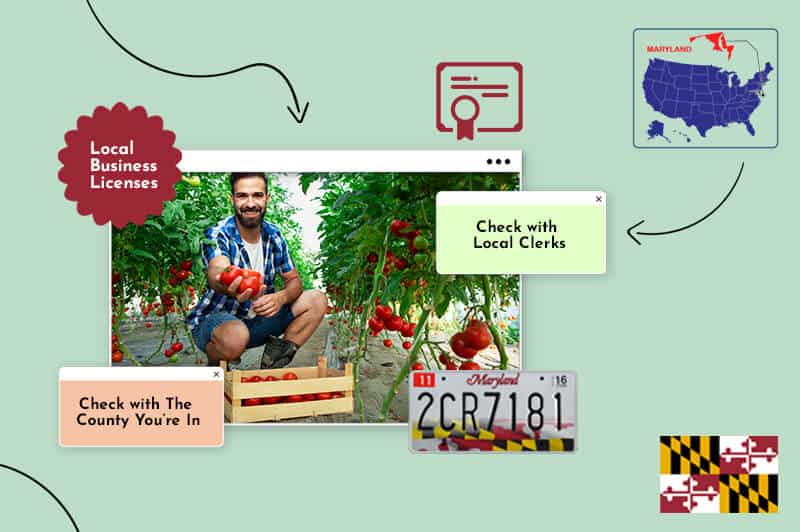Are you interested in how to start a business in Maryland? This is a wise option for protecting your business, but it takes a considerable amount of paperwork to get it up and running.
In addition to filing the required forms to register your business according to Maryland’s specific requirements, you may need to secure multiple licenses or permits.
The first step? Determining whether you need these—and which types are required. This can be surprisingly complicated, but we’re here to help.
Do I need a business license or permit in Maryland?
Technically speaking, licenses and permits aren’t outright required for every business in Maryland. Some organizations are able to lawfully conduct business without ever filing for a permit or a license.
This is rare, though, with the vast majority of local entities required to obtain at least a few forms of licensure. Chances are, if you conduct retail business or provide professional services, you will be responsible for obtaining an array of licenses or permits at the local, state and federal levels.
Contact the relevant state or local government office for more information.
What are business licenses and permits in Maryland?
At first glance, the terms “license” and “permit” seem interchangeable. Both involve more paperwork and filing fees than you’d prefer, not to mention a renewal process that takes place on an annual (or otherwise regular) basis.
Still, there are several differences worth considering, especially as you’re likely to obtain a series of both licenses and permits.
Business licenses
While differences exist between states and even municipalities, business licenses typically refer to actions that organizations might require authorization to take. For example, a trader’s license authorizes retail businesses to buy or sell products in the state of Maryland. Likewise, alcohol and tobacco licenses enable businesses to sell or manufacture restricted products. Other examples of business licenses include:
- Transient vendor license
- Chain store license
- Construction license
We’ll touch on several of these in more detail below. For now, it’s enough to know that licenses involve the active components of doing business in Maryland.
Permits
While the term “permit” is sometimes used to describe documents that better qualify as licenses, this generally applies to the health or safety concerns of running a business. Permits also commonly reference land use or zoning. Examples include:
- Demolition permit
- Building permit
- Tenant permit
- Minor privilege permit
- Wastewater discharge permit
In Maryland, most permits are assessed locally, while licensing commonly occurs at both the state and local levels.
How to register for business licenses and permits
There is no single process you can count on to file all licenses and permits in Maryland. How you navigate licensing will largely depend on which entities are responsible for approving various applications or accepting related fees. Your industry and legal entity will also have a discernible impact, as some types of businesses require more extensive licensing than others.
That being said, the process begins similarly for most Maryland businesses: You need to determine which types of licenses and permits are actually required. This means getting in touch with the proper authorities at the local, state, and federal levels.
Thankfully, the state of Maryland has created a solution to streamline this process: The OneStop portal. As its name indicates, this resource serves as a one-stop shop for many of your Maryland license and permit needs. The website provides a helpful search tool, as well as prompts for main licensure categories such as professional, business, and individual.
The OneStop portal also allows you to browse by state agencies. Examples include:
- Department of Health
- Department of Agriculture
- Department of Labor
- Department of Transportation
What happens if I fail to obtain a license or permit?
A lot goes into getting licensed to do business in Maryland. Now that you understand the full extent of the effort required, you might wonder, “Why bother?” The temptation to skip can be strong, but beware: Negligence can lead to some surprisingly harsh consequences.
The biggest hazard of operating without the necessary licenses or permits? The potential closure of your business. Known as forfeiture, this can occur if you don’t comply with key Maryland business regulations. If you suffer business forfeiture, your business will no longer be authorized to operate in the state of Maryland.
Thankfully, forfeiture is the final option after the state has made an extensive effort to get your business back on track. In all likelihood, you will be asked to pay various fines before the harshest repercussions are explored. Interest fees may also be assessed.
These can add up quickly, so it behooves you to take swift action as soon as you realize that you’re missing (or have failed to renew) an important license or permit.
Local business licenses

As you begin your search for necessary licenses and permits, it’s worth your while to get insight from local resources. Many experts can be found within your community. They will be happy to steer you in the right direction. Key resources worth exploring are described below.
Check with local clerks
Your local Office of the Clerk of the Circuit Court will be an invaluable resource for determining which licenses and permits are required based on your industry and location. These public institutions aim to provide fair and equitable service.
Typically, a Clerk of the Circuit Court will have a licensing department that is entirely dedicated to local license and permit concerns. As the Clerk of the Circuit Court for Howard County explains, every resident “is a potential recipient of the many services provided by the Clerk.”
Check with the county you’re in
In addition to working with the Clerk of the Circuit Court, the experts responsible for the Maryland Business Express website recommend checking with the offices of inspections, licenses or permits for your county. These departments are known by slightly different names in different counties.
In Baltimore County, for example, the Department of Permits, Approvals and Inspections is a wonderful resource. In Anne Arundel County, the Department of Inspections and Permits is a go-to option for permit processing, while Howard County provides information through the Department of Inspections, Licenses and Permits. If you struggle to identify the appropriate department, the Clerk of the Circuit Court may again prove helpful.
State business licenses

In Maryland, many permits and licenses are procured at the city or county level. A few licenses, however, are obtained on a statewide basis. Key examples include the sales and use tax license, as well as the trader’s license and the chain store license. These licenses must be obtained early on to ensure that you are authorized to do business in Maryland.
Sales and use tax license
Maryland assesses a sales tax of 6% on most purchases, as well as 9% for alcoholic beverages. Businesses that are responsible for collecting these taxes must obtain the sales and use tax license.
It’s common to streamline this process by completing a combined registration application, or CRA. Other registration processes covered by this comprehensive application include
- Alcohol tax license
- Tobacco tax license
- Transient vendor license
This application, like many in Maryland, requires the use of an employer identification number, or EIN. Other important details requested in the CRA include:
- Number of physical business locations in Maryland
- Names and contact information for LLC members
- Number of employees
- Trade nam (also known as “doing business as,” or DBA in Maryland)
- Plans for engaging in business activities that involve alcohol or tobacco
Trader’s license: What is it?
Essential for buying and selling goods, the trader’s license is a core requirement for many types of Maryland businesses. This should not be confused with a trader’s show license, which applies to those who are limited to temporary rental spaces. With a trader’s license, the vendor primarily does business in a fixed location.
How to obtain a trader’s license
Before you seek a trader’s license on behalf of your small business, you’ll need to get registered with the State Department of Assessments and Taxation. From there, you’ll obtain the application from your local Clerk of the Court. Be prepared to present your SDAT number to the Clerk.
Trader’s license fees
Fees for trader’s licenses largely depend on where your business is located and the wholesale retail inventory value. Outside of Baltimore City, this ranges from just $15 (for inventory of under $1,000) to $800 (for inventory exceeding $750,000). In Baltimore, the maximum fee for the trader’s license is far higher: $2,125.
Chain store license
In addition to paying the aforementioned fees for the trader’s license, many Maryland businesses must also obtain a chain store license. This applies to any business that operates two or more stores using the same general management.
Businesses with 5 locations or fewer pay a small fee of $5 per location. This fee increases as more stores are added. Maryland businesses with 20 stores or more pay a maximum of $150 per store (or $300 per store for large chains in Cecil County).
Resale certificate
Maryland does not provide an official resale certificate or reseller’s permit. This document reflects how retailers pay (or, more often, don’t pay) sales taxes to vendors, versus customers covering the cost of the sales tax. These collected sales taxes are passed on to the Comptroller of Maryland.
The resale certificate makes it possible to complete tax-exempt purchases for products that will eventually be resold. The Comptroller provides a sample resale form for guidance.
Federal business licenses

Many business leaders are relieved to discover that federal licenses and permits are not outright required for all Maryland LLCs. Exceptions exist, however, and you should examine them carefully to ensure that you’re fully compliant with all federal license requirements.
Are there mandatory federal licenses?
The need to obtain federal licenses will largely depend on your specific business plans. If the scope of your business extends to heavily regulated areas, you can expect at least some level of federal oversight. Common activities that call for federal licenses and permits include:
- Alcoholic beverages
- Firearms
- Broadcasting
- Agriculture
- Fish and wildlife
- Aviation
- Firearms and ammunition
- Mining and drilling
Unfortunately, since some activities are regulated by multiple agencies, you may need to obtain several federal licenses or permits. If you’re struggling to determine which federal obligations you need to fulfill as a Maryland LLC, look to the Small Business Administration for insight.
What do I need to file for a license?
Filing requirements vary from one license to the next, so you’ll need to check with the appropriate bureau or agency to determine what, exactly, this process involves.
In most situations, you’ll need to provide a basic overview while applying, complete with contact information and details about the purpose of your business. You may also need to submit your EIN. This 9-digit identifier functions a lot like your Social Security number but is intended for business purposes.
Other potential necessities include:
- Trade name or DBA designation
- SDAT identification number
- Legal business address
- Other contact information, such as your business phone number
- Details about the purpose of your business
- Number of employees
- Anticipated annual sales
Conclusion
Getting licensed to do business in Maryland can be one of the most frustrating aspects of forming an LLC. Do your homework, though, and you may find that this process is easier than anticipated.
Don’t hesitate to seek assistance from local, state and federal agencies, which can help you determine which licenses or permits you need – and how to get them. The sooner you take care of these obligations, the sooner you can focus on what you do best: Running your business. If you need more information on how to form an LLC in Maryland, we’re here to help.
